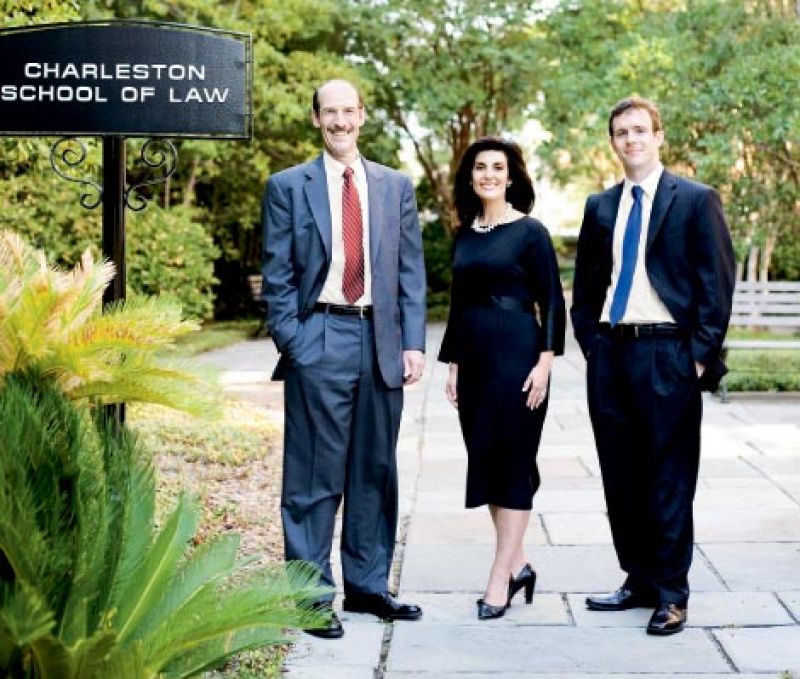
The corridors of most law schools sport stuffy portraits of robed elders, solemn reminders of the legal legacy graduates are expected to follow. At Charleston School of Law, lights shine on portraits of third-year students named by peers and faculty for their individual commitment to the pro bono spirit.
Forget every lawyer joke you’ve ever heard; there’s a new breed of attorney emerging, and Charleston just may be ground zero in a movement for good. Thank the school’s founders, who wove service into its DNA. Dean Andy Abrams recounts the quintet of lawyer/jurists who examined their own legal education against the careers they ultimately navigated: “They asked themselves, ‘If we had known then what we know now, what would we do differently?’”
In shaping a legal education framework for the future, they landed on the theme of service. Pro Bono Populi, which means “for the good of people,” emerged as the nascent school’s motto. From day one, Charleston School of Law required its students to log 30 hours of pro bono service before graduation (faculty are also asked to provide 30 hours every three years). “Students see coming here as a real opportunity to contribute,” says Abrams. “Frankly, they are better people than we were when I was in law school.”

Give & Learn: (Clockwise from left) Law students Clark Grounsell, Jonathan Edwards, and Lauren Schumann; “Public service allows me to do what I enjoy for the people who truly need help,” says Schumann; Grounsell works with attorney Marvin Feingold of Pro Bono Legal Services, Inc.
Initial students were so enthusiastic that the school had to impose a waiting period and now requires students to finish two semesters before digging in to giving back. Indeed, “enthusiastic” understates pupil response to the program. During its recent ABA accreditation process, the school’s administrators determined that 80 percent of the student body provide more than the required pro bono time; an astonishing one-third are donating 100 hours or more. “It was an incredibly touching discovery,” Abrams says.
Michelle Condon oversees the pro bono program and maintains a list of about 125 pre-approved pro bono sites. Students can also work with her to tailor an experience that meets the school’s guidelines. The requirements are simple: students must be supervised by a licensed attorney in governmental (including judicial), nonprofit, charitable, or educational settings. They can also work for private attorneys with pro bono or court-appointed cases. They cannot earn pay or credit, but can serve anywhere in the nation. “Some of our students have really found their calling through their pro bono work,” Condon says, noting that students have fallen in love with estate planning, public defense, and a host of other specialties.
Jonathan Edwards is one of them. The third-year student considered dozens of schools before choosing Charleston School of Law, and says the commitment to service set it apart. His peers also tend to select the school in part because of the pro bono program; and even those who arrive unsure about their desire to give back often become converts.
“The key to being successful in this profession is to work hard on the legal issues that matter most to you,” says Edwards, who has given 93 hours to date, digging into complicated heirs property issues and working with an organization that seeks to end cyber bullying. “Through pro bono service, I have been able to do substantive work in several areas of law,” he notes. “The most surprising thing about it is just how many people’s lives you can positively impact simply by doing what you love.”
Charleston School of Law
Surpassing the Bar:
The law school is one of only a few in the nation that require its students, as a condition of graduation, to perform at least 30 hours of free legal work in the public interest under the supervision of a licensed, practicing attorney.
Words to Live By:
Its motto, Pro Bono Populi, translates to “for the good of people” and adds up to a whole lot of giving back.
Non-Billable Hours:
Five classes have graduated to date; and the students have donated some 102,800 hours of pro bono service to community/nonprofit organizations.
Winning at Giving:
Peter Kaufman, a December 2010 graduate, set the school’s individual pro bono record with a whopping 1,550 hours.
Where They Share:
About 125 sites qualify for help, including Crisis Ministries, Homeless Justice Project, Center for Heirs’ Property Preservation, Charleston Pro Bono Legal Services, South Carolina Legal Services, and the Medical University of South Carolina, as well as numerous courts, public defenders and solicitors offices, state agencies, and municipalities.